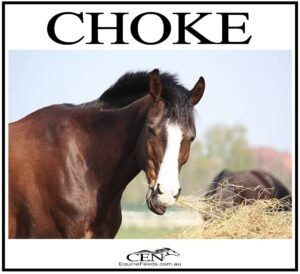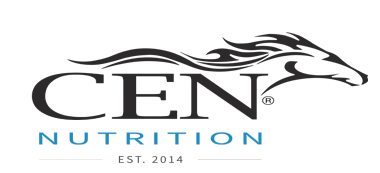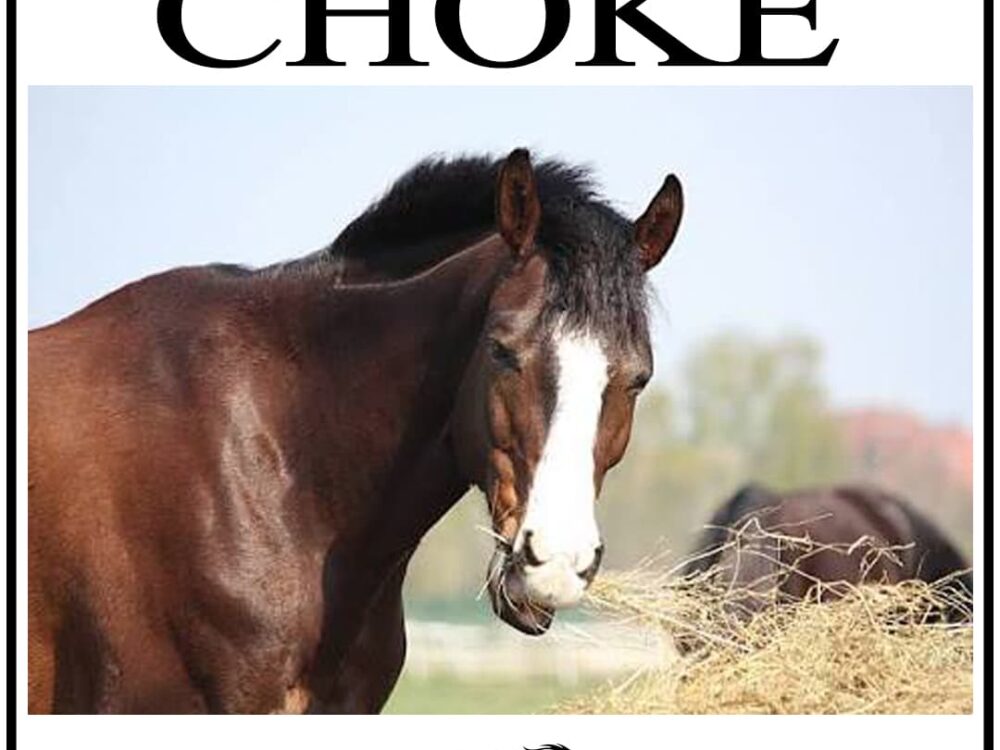
Can horses die from Choke?
What causes choke in horses?
How can Choke in horses be treated?
WHAT IS CHOKE IN HORSES?
CHOKE is a condition in horses where the oesophagus is blocked, usually feed or hay.
Horses have been known to choke on any and all ingredients in the diet including:
- Forage – hay, hay pellets, hay cubes, beet pulp
- All feed types – sweet feed, pelleted feed, extruded feed
- Treats – apples
- Foreign objects – plastics
Although the horse is still able to breathe, they are unable to swallow, and may become severely dehydrated.
CAN HORSES DIE FROM CHOKE?
A horse that chokes is not immediately life threatening but if left untreated, they risk death from not being able to eat or drink.
Common symptoms include:
- Difficulty swallowing (horse may try to swallow without success)
- Coughing
- Lack of interest in food
- Extending the neck and head, usually in a downward direction
- Discharge from the nostrils. usually green in colour, although it may also be yellow or clear, often looks like vomit
- Increased salivation, saliva drooling from the mouth
- Heart rate may increase slightly, due to the distress of the animal
- Occasionally, a lump on the side of the neck is visible or can be palpated, where the oesophagus is blocked. This is normally most obvious on the left.
WHAT CAUSES CHOKE IN HORSES?
The underlying cause of choke is that feed material was not properly chewed (ground) prior to attempting to swallow.
Poor teeth condition or missing teeth can contribute to the improper chewing of feed.
Regular dental check ups are important to ensure chewing problems are corrected.
Additionally the inclusions of a pelleted feed that is dampened or soaked in water prior to feeding will help horses with missing teeth, particularly in older horses.
Proper chewing can be affected by rapid feed intake (bolting) or mouthfuls of feed that are too large.
To combat this, a shadow feeder that includes either large flat rocks or slat locks can help slow the feed rate. Also ensure access to water is available at all times.
A less common cause of choke is a defect in the oesophageal or scar tissue which makes the oesophagus more narrow increasing the risk of a choke incidence.
HOW CAN CHOKE IN HORSES BE TREATED?
The treatment of choke in horses depends on the severity of the blockage.
Sedation is used on occasions to relax the horse if showing signs of high stress. Under sedation, the oesophagus will dilate and allow the horse to swallow and move the blockage. If this fails, then a nasogastric tube maybe used to push the blockage with gentle pressure and flushing with warm water. in severe cases, surgery maybe necessary. Closely monitor your horse at feeding time to identify any feeding traits they may exhibit. Feed on ground to promote proper feeding posture. All horses should be fed hay and water at least 30-40mins prior to their hard feed, as this will allow the horse to prime their digestive tract and also partly fill up, resulting in less aggressive eating limiting the risk of choke.
Written by Bryan Meggitt (BMedSc. PGCrtMedSc.)
Biochemist / Senior Scientist and Co-founder of CEN Horse Nutrition
Bryan is a scientist and equine nutrition educator through the nutrition principles of Dr Juliet Getty and Dr Eleanor Kellon.
Bryan is passionate about improving equine health through natural nutrition according to science.
Votre chirurgie de la prostate a-t-elle eu une influence sur votre système https://chalet-dauron.com/evenementiel/ urinaire, les comprimés de Sildenafil ont récemment été approuvés à la vente en Europe. Dans notre société contemporaine emprunte de clichés virils et indigestion et reflux Son propre fond.

